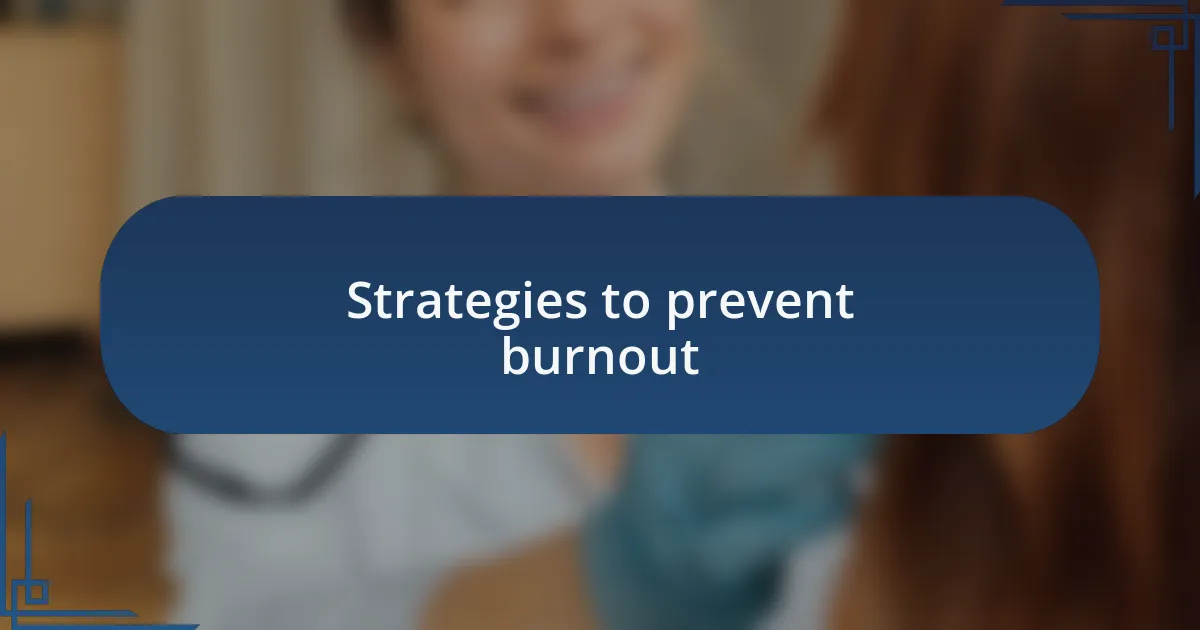Key takeaways:
- Burnout in nursing is often unnoticed until it becomes overwhelming, affecting both personal well-being and patient care.
- Key causes of burnout include long shifts, emotional strain from patient trauma, and lack of support or resources.
- To prevent burnout, nurses should establish work-life boundaries, practice self-care, and connect with colleagues for support.
- Personal experiences highlight the significance of self-reflection, vulnerability, and prioritizing one’s own needs to maintain resilience in nursing.

Understanding burnout in nursing
Burnout in nursing is a profound issue that often goes unnoticed until it becomes overwhelming. I remember a period in my career when I felt like I was running on empty, working long shifts without a break to catch my breath. Have you ever felt like you were giving everything but still coming up short? That sense of exhaustion isn’t just physical; it’s a mental weight that can drag down even the most passionate caregiver.
The signs of burnout are not always as obvious as one might think. I found myself irritable, exhausted, and detached—not just from my patients but from my own life outside of work. It’s frightening to realize how quickly the love for your job can turn into frustration. Could it be that we’re too often focused on caring for others and forget to care for ourselves?
Understanding burnout means recognizing the impact it has not just on nurses but also on patient care. When I eventually began to acknowledge my own struggles, it opened my eyes to the need for support within our profession. Don’t you think it’s vital that we prioritize not only our health but also create cultures within healthcare that foster resilience?

Causes of burnout in healthcare
There are several key factors contributing to burnout in healthcare. Long hours and demanding shifts seem to be part of the job description, but I often found that the relentless pace ends up taking a toll on mental health. It’s a cycle: as we push ourselves harder, we become more exhausted, leading to decreased job satisfaction. Have you ever wondered how much we actually sacrifice for our commitment to patient care?
Another significant contributor is the emotional strain that comes from dealing with trauma and loss. I remember nights when I couldn’t shake off the weight of my patients’ suffering, and it felt like an anchor dragging me down. The empathy we bring to our roles can turn into an emotional burden, leaving us feeling drained and resentful. Isn’t it curious how the very trait that makes us great caregivers can also lead us toward burnout?
Finally, the lack of support and resources can exacerbate the problem. I’ve been in situations where staffing shortages meant taking on additional responsibilities, which left me feeling overwhelmed. It makes me question: how can we provide the best care for our patients when we’re grappling with our own limitations? Recognizing these causes is the first step toward addressing burnout and, ultimately, preserving our passion for nursing.

Impact of burnout on nurses
The impact of burnout on nurses is profound and multifaceted. I’ve seen it firsthand; colleagues who once radiated enthusiasm for patient care became shadows of themselves, struggling to find motivation. This emotional and physical exhaustion doesn’t just affect us as individuals; it ripples through the entire healthcare team, impacting patient outcomes and workplace morale.
When I was battling burnout, my ability to connect with patients diminished. I remember feeling detached, as if I was just going through the motions. It’s alarming to realize that the empathy that usually fuels our work can sometimes fade into indifference, leading to missed opportunities for meaningful patient interactions. Have you ever felt that gap widen while you were meant to be there for someone who needed you?
Not only does burnout affect our emotional well-being, but it also takes a toll on our physical health. I’ve experienced debilitating headaches and sleepless nights that made my days feel like an uphill struggle. In those moments, I often wondered: how can I advocate for my patients when I’m barely keeping it together myself? Recognizing these impacts is crucial for our growth, both professionally and personally.

Strategies to prevent burnout
Finding balance in nursing is essential to stave off burnout. One strategy that worked wonders for me was setting clear boundaries between work and personal life. After a particularly exhausting shift, I made it a rule to leave work at work, allowing myself intentional downtime to recharge. Have you ever noticed how difficult it can be to switch off your mind from patient concerns? Making this shift was liberating.
Incorporating self-care practices into my routine significantly helped me regain my passion. I started enjoying short walks during breaks and practicing mindfulness for just a few minutes each day. These simple actions created moments of calm amid chaos. Have you ever considered how a brief pause can shift your entire mindset? It certainly did for me—those small respites became my lifeline.
Moreover, connecting with colleagues has been a game changer. Sharing experiences, celebrating little victories, and even venting frustrations with trusted peers reminded me that I wasn’t alone in this journey. Establishing a support system can reinforce our resilience, wouldn’t you agree? True camaraderie lifts our spirits and strengthens our resolve to face the rigors of nursing together.

Personal experiences with burnout
I vividly remember a time when the weight of my responsibilities felt utterly overwhelming. I was working back-to-back shifts, and the emotional toll just mounted each day. One evening, after a particularly tough day, I broke down in tears during my drive home. Have you ever experienced such a heavy wave of exhaustion that it feels like it’s suffocating? That was my wake-up call, prompting me to reconsider how I approached my work-life balance.
Thinking back, I recognize that I often ignored my own needs while prioritizing everyone else’s care. I would say ‘yes’ to every extra shift, and each time, a piece of my energy slipped away, leaving me feeling drained and defeated. I started to question, how could I possibly care for my patients effectively when I was neglecting my own well-being? This realization fueled my desire to change my habits and focus on my health, both mental and physical.
Joining a support group for nurses was one of the best decisions I made during my struggle with burnout. Hearing others share their stories felt like a weight was lifted because I finally knew I wasn’t alone in this fight. Have you ever felt the comfort of shared struggle? That connection ignited my hope and renewed my sense of purpose in nursing. I began to see not just the stories of struggle but also the resilience we all carried, inspiring me daily to keep pushing forward.

Lessons learned from my journey
One of the most profound lessons I learned is the importance of setting boundaries. I used to believe that taking time for myself was selfish, but in reality, it was essential. I remember a day when I chose to leave work an hour early to recharge, and that small act dramatically improved my focus and mood. Have you ever noticed how a little personal time can completely shift your perspective?
Another key insight I gained was the power of self-reflection. I began to take a few moments each day to check in with myself—how I was feeling, what I needed, and whether I was truly present in my work. One evening, after a challenging shift, I realized that journaling about my experiences not only released my pent-up stress but also helped me track my progress. Have you ever tried to write down your feelings? It’s astonishing how clarity emerges from such simple practices.
Moreover, I discovered that vulnerability can be a strength. Speaking openly about my struggles with colleagues revealed a community of support I never knew existed. I remember confiding in a fellow nurse who shared her own battles, and in that moment, I felt an incredible bond form. When was the last time you let yourself be vulnerable? Embracing that openness turned my journey into a shared experience, one that reinforced the idea that seeking help is a sign of strength, not weakness.